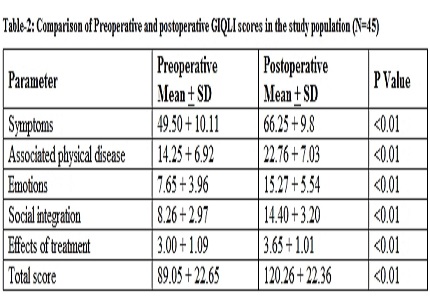Improvement in quality of life in patients with Fistula-In-Ano, following surgical management, a prospective observational study
Abstract
Background: Fistula-in-ano may lead to significant worsening of quality of life of affected person. But studies documenting the impact of treatment on quality of life are very limited in Indian population. Hence the current study was conducted with an objective of asseseing the improvement in quality of life in patients undergoing surgical management of fistuala-in-ano in a tertiary care teaching hospital in south India.
Methodology: The current study was a prospective observational study, conducted in the department of general surgery of Dr. SMCSI Medical college hopital, between February and December 2016. A total of 45 subjects aged between 20 to 80 years, suffering from various types of fistual in ano, managed with surgical intervention were included in the study. Quality of life before and after surgery was assessed by GIQLI questionnaire.
Results: Among the 45 subjects, 71.11% were males majority were aged between 41 to 60 years. The proportion of Inter sphincteric fistula was 48.88% whereas Trans-sphincteric fistula and Supra sphincteric fistula were 33.33% and 17.77% respectively. Fistulectomy was conducted in 44.44% of cases. Fistulotomy and insertion of cutting setons were done in 31.11% and 24.44% cases. Mean values of symptoms pre and post-operative were 49.50 and 66.25 and the association was statistically significant (P=<0.01). Mean associated physical disease was 14.25 before surgery and the post-operative mean was 22.76 with a statistically significant mean difference (P=<0.01). Preoperative Mean values for emotions, social integration, and effects of treatment were 7.65, 8.26 and 3.00 respectively, whereas Post-operative means were 15.27, 14.40 and 3.65. There were statistically significant mean differences for Emotions, social integration and effects of treatment. Mean Total score of pre-surgery was 89.05 and post-surgery was 120.26 with statistically significant mean difference. (P=<0.01).
Conclusions: 1) There is a significant improvement in the quality of life postoperatively in patients of Fistula in ano. 2) GIQLI score is an useful tool to assess the quality of life in Fistula in ano patients.
Downloads
References
2. Grucela A, Gurland B, Kiran RP. Functional outcomes and quality of life after anorectal surgery. Am Surg. 2012 Sep;78(9):952-6. [PubMed]
3. Shouler P, Grimley R, Keighley M, Alexander-Williams J. Fistula-in-ano is usually simple to manage surgically. International journal of colorectal disease. 1986;1(2):113-5.
4. Arroyo A, Pérez-Legaz J, Moya P, Armañanzas L, Lacueva J, Pérez-Vicente F, et al. Fistulotomy and sphincter reconstruction in the treatment of complex fistula-in-ano: long-term clinical and manometric results. Annals of surgery. 2012;255(5):935-9. [PubMed]
5. Garcia-Aguilar J, Belmonte C, Wong WD, Goldberg SM, Madoff RD. Anal fistula surgery. Factors associated with recurrence and incontinence. Dis Colon Rectum. 1996 Jul;39(7):723-9. [PubMed]
6. Lunniss P, Kamm M, Phillips R. Factors affecting continence after surgery for anal fistula. British journal of surgery. 1994;81(9):1382-5. [PubMed]
7. Wong S, Solomon M, Crowe P, Ooi K. Cure, continence and quality of life after treatment for fistula-in-ano. ANZ J Surg. 2008 Aug;78(8):675-82. doi: 10.1111/j.1445-2197.2008.04616.x. [PubMed]
8. Sailer M, Bussen D, Debus ES, Fuchs KH, Thiede A. Quality of life in patients with benign anorectal disorders. Br J Surg. 1998 Dec;85(12):1716-9. [PubMed]
9. Eypasch E, Williams J, Wood‐Dauphinee S, Ure B, Schmulling C, Neugebauer E, et al. Gastrointestinal Quality of Life Index: development, validation and application of a new instrument. British Journal of Surgery. 1995;82(2):216-22.
10. Seneviratne SA, Samarasekera DN, Kotalawala W. Quality of life following surgery for recurrent fistula-in-ano. Tech Coloproctol. 2009 Sep;13(3):215-7. doi: 10.1007/s10151-009-0517-z. Epub 2009 Jul 18. [PubMed]
11. Visscher AP, Schuur D, Roos R, Van der Mijnsbrugge GJ, Meijerink WJ, Felt-Bersma RJ. Long-term follow-up after surgery for simple and complex cryptoglandular fistulas: fecal incontinence and impact on quality of life. Dis Colon Rectum. 2015 May;58(5):533-9. doi: 10.1097/DCR.0000000000000352. [PubMed]
12. Eypasch E, Williams JI, Wood-Dauphinee S, Ure BM, Schmülling C, Neugebauer E, Troidl H. Gastrointestinal Quality of Life Index: development, validation and application of a new instrument. Br J Surg. 1995 Feb;82(2):216-22. [PubMed]
13. Leroy A, Azais H, Giraudet G, Cosson M. [Quality of life and symptoms before and after surgical treatment of rectovaginal fistula]. Progres en urologie : journal de l'Association francaise d'urologie et de la Societe francaise d'urologie. 2017,10.1016/j.purol.2016.12.001.
14. Owen HA, Buchanan GN, Schizas A, Cohen R, Williams AB. Quality of life with anal fistula. Annals of the Royal College of Surgeons of England. 2016;98(5):334-8,10.1308/rcsann.2016.0136.
15. Ortiz H, Marzo J, Armendariz P, De Miguel M. Quality of life assessment in patients with chronic anal fissure after lateral internal sphincterotomy. Br J Surg. 2005 Jul;92(7):881-5.



 OAI - Open Archives Initiative
OAI - Open Archives Initiative


















 Therapoid
Therapoid

